The first priest in the Bible, Melchizedek, holds secrets of eternal priesthood—discover his mysterious origins and lasting impact.
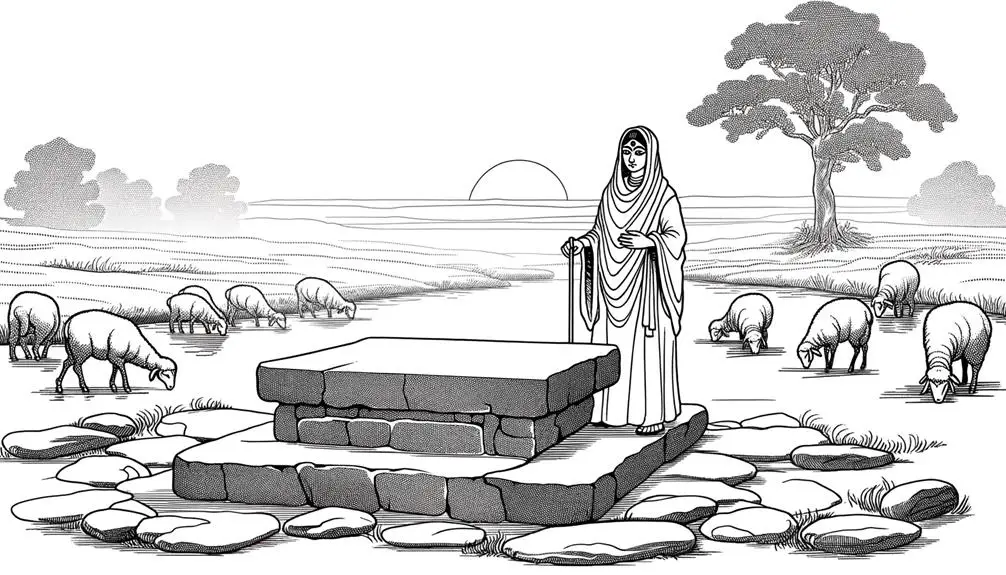
First Priest in the Bible
You'd encounter Melchizedek as the first priest mentioned in the Bible, appearing in Genesis. This unique figure holds both kingly and priestly titles, presiding in Salem—likely ancient Jerusalem. His genealogy remains unrecorded, emphasizing a mystical, eternal aspect to his priesthood. Melchizedek's encounter with Abraham, involving the offering of bread and wine, prefigures the Christian Eucharist and sets a precedent for sacrificial practices linked to divine favor. This priesthood, everlasting in its nature, introduces a profound layer to spiritual leadership within biblical narratives. This initial glimpse into his role invites further exploration into his lasting theological impact.
Key Takeaways
- Melchizedek is considered one of the earliest priestly figures in the Bible, appearing in Genesis 14.
- He was both a king and a priest of Salem, linked to ancient Jerusalem.
- Melchizedek blessed Abraham with bread and wine, symbolizing sacrificial gifts.
- His priesthood is marked by a lack of genealogy, emphasizing an eternal quality.
- Melchizedek's encounter with Abraham showcases his authority and priestly role early in biblical history.
Who Was Melchizedek?
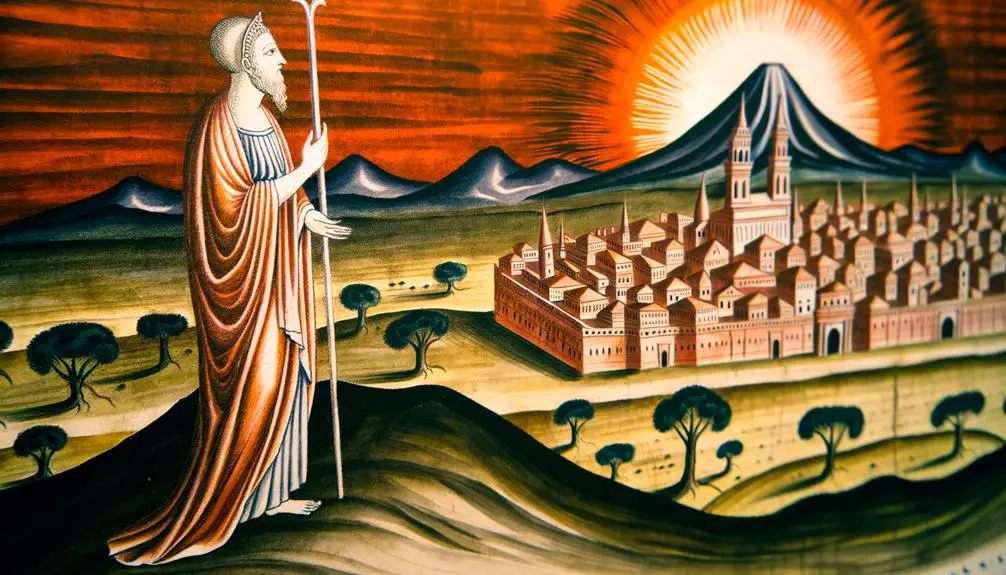
Melchizedek, a figure shrouded in mystery, serves as both king and priest in the biblical narrative, embodying a unique dual role that has intrigued scholars and theologians alike. His origins present a genealogical mystery, as the scriptures provide no lineage, setting him apart from other biblical figures whose ancestries are meticulously recorded. This absence of genealogy is pivotal, highlighting his symbolic role as a priest not bound by hereditary constraints, which is a marked deviation from the typical biblical protocol.
You'll find that Melchizedek's association with Salem, believed to be ancient Jerusalem, positions him within the context of Ancient Canaanite society. This setting is important for understanding his role and the broader socio-religious landscape of the time. His title, King of Salem, and his role as priest of the Most High God suggest a significant religious and political status in a region where cities were often city-states with their own rulers and deific patrons.
The lack of detailed background prompts a focus on his functions rather than his origins, emphasizing his archetypal significance as a mediator between God and people, which prefigures later religious figures who also bridge divine and earthly spheres. This analysis underscores the layered complexity and enduring fascination with Melchizedek's character in biblical studies.
Melchizedek's Encounter With Abraham
Building on our understanding of his unique role, let's examine Melchizedek's significant encounter with Abraham, which further illuminates his function and influence within the biblical narrative. This divine meeting occurred after Abraham's victorious return from battling the kings. Melchizedek, the King of Salem and priest of the Most High God, emerged with bread and wine, symbolizing sacrificial gifts, to bless Abraham.
This interaction wasn't merely a casual meeting; it was laden with deep spiritual and theological significance. Melchizedek's offering of bread and wine prefigured the later Christian Eucharist, indicating a sacrificial tradition that transcended time. His blessing of Abraham linked the patriarch more closely to divine purposes, affirming his victory as divinely sanctioned and his mission divinely guided.
Here's a brief table to encapsulate the elements of their encounter:
Aspect |
Detail |
Significance |
|---|---|---|
Figure |
Melchizedek, King of Salem |
Represents a priestly authority |
Offering |
Bread and wine |
Prefigures Christian Eucharistic practices |
Blessing |
Blesses Abraham and God |
Affirms divine favor and Abraham's role |
This meeting underscores the pivotal role of Melchizedek as a priestly figure who not only intersects with Abraham's journey but also enriches the theological tapestry of sacrificial tradition within the sacred texts.
The Significance of Melchizedek's Priesthood
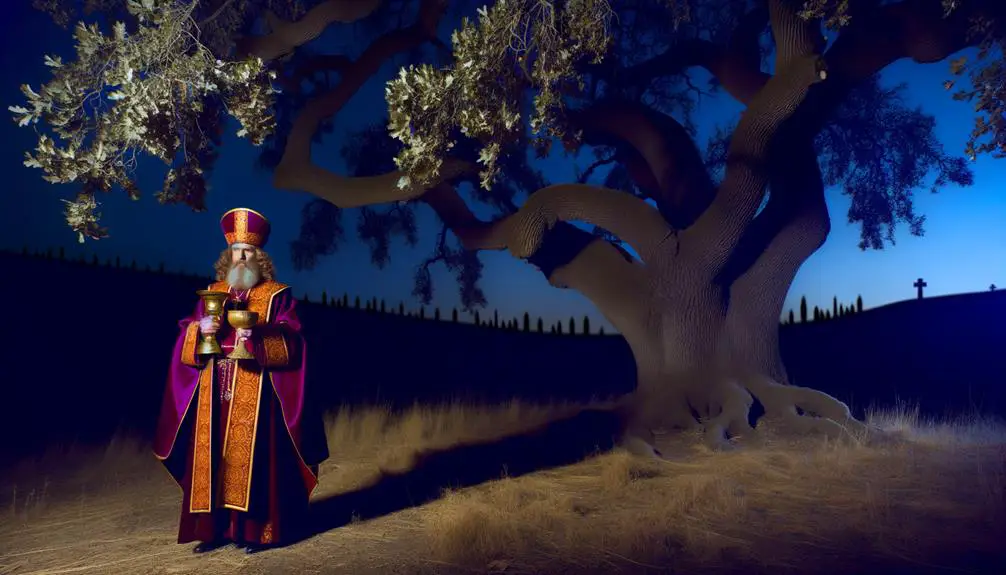
The priesthood of Melchizedek holds profound theological importance, as it introduces a unique, eternal dimension to the concept of priestly mediation in the scriptural texts. You'll find the genealogical mystery surrounding Melchizedek particularly intriguing. Unlike traditional priests of the time, his lineage isn't documented in religious texts, which suggests a symbolic significance that transcends ordinary ancestral lines. This absence of genealogy highlights his role as a figure representing an everlasting priesthood, as noted in the Psalms and expounded in the Book of Hebrews.
Furthermore, Melchizedek's offering of bread and wine carries sacrificial symbolism that prefigures the Last Supper, intertwining his priesthood with the ideals of sacrifice and redemption. This act not only elevates his status as a priest but also connects his ministry to Jesus Christ's, who is later described as a priest "after the order of Melchizedek." This connection implies an eternal, unbroken priesthood that surpasses the temporal and often hereditary nature of Levitical priesthoods.
In exploring Melchizedek's priesthood, you're delving into a rich tapestry of theological themes that challenge and enrich the traditional understanding of sacrificial roles and priestly functions in biblical doctrine.
Biblical References and Interpretations
Various biblical texts provide a nuanced understanding of Melchizedek's role, illustrating divergent interpretations that have evolved over centuries. As you explore these scriptures, you'll notice how each passage contributes uniquely to the portrayal of this enigmatic figure, particularly focusing on his priestly duties and functions.
- Genesis 14:18-20: This passage is pivotal as it introduces Melchizedek blessing Abram and offering bread and wine, which many scholars interpret as early forms of sacrificial rituals. There's no mention of priestly garments here, yet the offering signifies a priestly act.
- Psalm 110:4: Here, the psalmist refers to a priest forever in the order of Melchizedek, emphasizing a perpetual, divine appointment that transcends traditional Levitical attire and rituals.
- Hebrews 7: This New Covenant book extensively discusses Melchizedek's priesthood, comparing it with Jesus' priesthood. It highlights the absence of genealogical constraints, suggesting a higher, mystical significance, possibly reflected in unique priestly garments and non-Levitical sacrificial rituals.
These references collectively suggest that while Melchizedek's priestly garments and specific sacrificial rituals aren't explicitly detailed, his role transcends conventional priestly functions, serving as a bridge between the old and new covenants, and inviting deeper theological reflection.
Melchizedek in Jewish Traditions
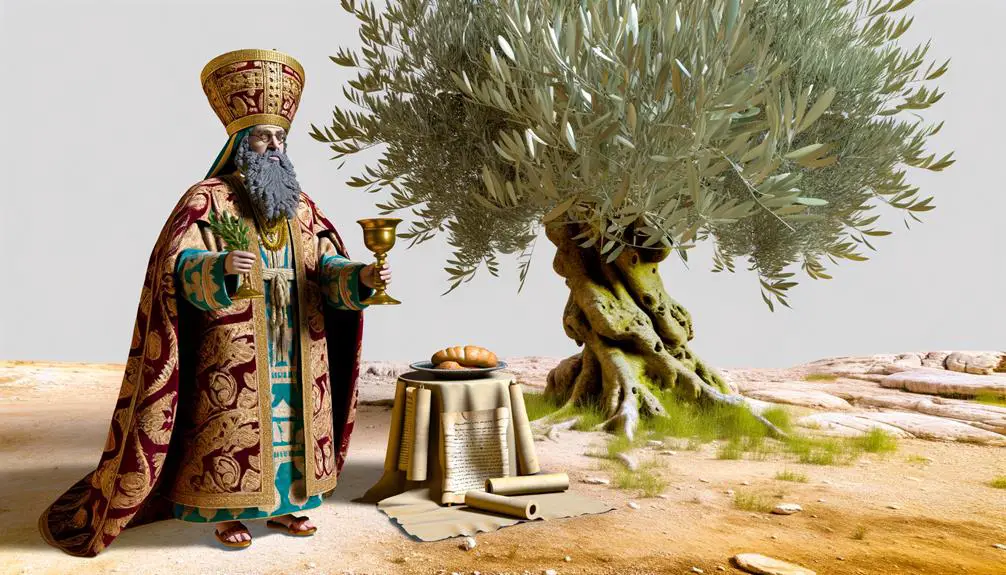
Delving into Jewish traditions, you'll find that Melchizedek is often portrayed as a figure of significant mystery and spiritual authority. This genealogical mystery largely stems from the scant details provided in the Hebrew Bible, where he appears without any lineage or family history, setting him apart from other biblical figures who are typically introduced with detailed genealogical records. This absence of ancestry has fueled much speculation and interpretative narratives among Jewish scholars.
In the Midrash and Talmud, Melchizedek is sometimes identified with Shem, the son of Noah, which some argue is an attempt to resolve his mysterious origins by linking him to a well-known biblical lineage. This association enhances Melchizedek's stature as a priest, connecting him to the ancient sacrificial practices that predate the Levitical priesthood. These texts highlight his role in offering bread and wine, which is interpreted not merely as a communal meal but as a proto-sacrificial ritual, suggesting an early form of worship and priestly mediation.
Therefore, in Jewish thought, Melchizedek serves not only as a bridge between pre-Abrahamic and Abrahamic faiths but also symbolizes the continuity and evolution of sacrificial practices within ancient religious frameworks. His figure embodies both a theological enigma and a pivotal role in the sacred narratives.
Christian Perspectives on Melchizedek
In Christian theology, Melchizedek's enigmatic nature is often interpreted as a prefiguration of Christ, emphasizing his role as a priest who transcends traditional Judaic boundaries. You'll find that his appearance in Genesis, where he blesses Abraham and is called 'priest of God Most High,' establishes a foundation that resonates deeply with Christian ideals of priesthood and sacrifice. This figure is shrouded in a timeless mystery, one that doesn't just capture the imagination but also invites deep theological exploration.
- Divine Origin: Melchizedek is portrayed without any genealogical context, which many theologians argue suggests his divine nature. This lack of lineage is pivotal in contrasting him with Old Covenant figures who are heavily defined by their genealogies.
- King and Priest: As both a king and a priest, Melchizedek embodies a dual role that Christ is prophesied to fulfill, linking regality with spiritual authority in a manner unique in scriptural texts.
- Bread and Wine: His offering of bread and wine prefigures the Christian Eucharist, suggesting a symbolic anticipation of Jesus' Last Supper, which is central to Christian liturgy.
This dual capacity and his mysterious, brief biblical appearance underscore a figure meant to signify something greater than himself—a foreshadowing of Christ's eternal priesthood and sacrifice.
Melchizedek's Legacy and Influence
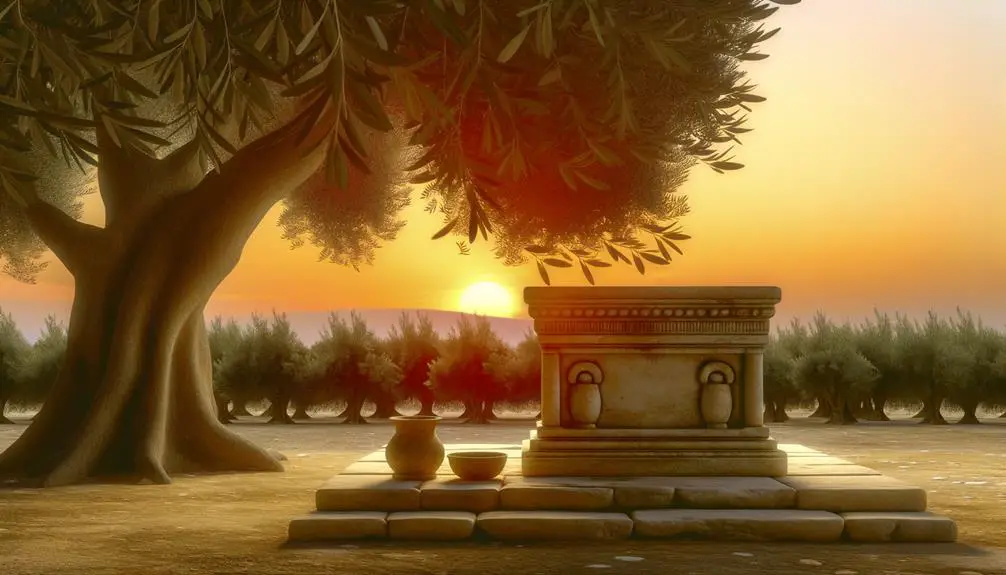
You'll find that Melchizedek's role as portrayed in the Bible not only establishes him as a seminal figure in religious narratives but also as a bridge in theological discourse. His unique position, without genealogy and an eternal priesthood, challenges traditional ecclesiastical structures and prompts a reevaluation of spiritual authority. This rethinking has profoundly shaped both historical and contemporary theological thought, influencing doctrines and dialogues across various denominations.
Melchizedek's Biblical Role
Melchizedek's role in the Bible, while briefly mentioned, has exerted a profound influence on both theological thought and liturgical traditions. You'll find his character enigmatic, particularly with the genealogy mysteries surrounding him. Unlike other biblical figures, Melchizedek appears without a detailed lineage, sparking endless scholarly debate. His kingly duties, combined with his priestly role, make him a unique dual-figure in sacred texts, symbolizing a bridge between earthly authority and divine service.
To deepen your understanding, consider these aspects:
- Genealogical Anomalies: Why is his lineage absent?
- Royal and Priestly Fusion: How does this dual role enhance his biblical significance?
- Scriptural Rarity: Why are such characters rare in ancient texts?
This complexity invites you to explore the layers beneath the surface of biblical narratives.
Impact on Religious Thought
Reflecting on Melchizedek's unique biblical presence, it's evident that his legacy profoundly shapes contemporary religious thought. His role as both king and priest encapsulates a dual authority not commonly seen in scriptural narratives, which enriches the priestly symbolism in theological discourse. This figure embodies an intercessory role that predates and forecasts the Christological figure who mediates between God and humanity. The theological implications of Melchizedek's priesthood are critical as they suggest an eternal, unbroken priestly order. His appearance in Psalms and Hebrews underscores his significance as a model of righteousness and peace, influencing how you understand priesthood and intercession in a religious context. Melchizedek's portrayal adds a profound layer to interpreting sacred texts and their application to spiritual leadership.
Frequently Asked Questions
How Does Melchizedek's Priesthood Compare to Modern Religious Leadership Roles?
Melchizedek's priesthood, characterized by its unique spiritual authority and lack of priestly succession, differs notably from modern roles that typically involve formal hierarchies and clear lines of institutional succession within religious organizations.
What Archaeological Evidence Exists Regarding Melchizedek?
You're diving into a sea of mysteries when exploring archaeological evidence about Melchizedek. Ancient inscriptions and textual analyses suggest scant physical proof, yet they offer invaluable insights into his historical and religious significance.
Are There Any Festivals or Holidays Dedicated to Melchizedek?
There aren't specific festivals dedicated to Melchizedek, but his symbolism often surfaces in interfaith celebrations, highlighting themes of peace and righteousness, resonating across various religious traditions with scholarly interest in such unique scriptural figures.
How Do Non-Abrahamic Religions View Melchizedek?
In the tapestry of global beliefs, Melchizedek's symbolism transcends Christian doctrine, weaving through various non-Abrahamic religions via interfaith interpretations, often embodying mystical or esoteric wisdom that resonates with broader spiritual narratives.
What Artistic Depictions Exist of Melchizedek in History?
In exploring Melchizedek's iconography, you'll find symbolic interpretations abound, from medieval frescoes to Renaissance paintings, reflecting his enigmatic role across various artistic periods, each offering a unique, layered portrayal of this mysterious figure.

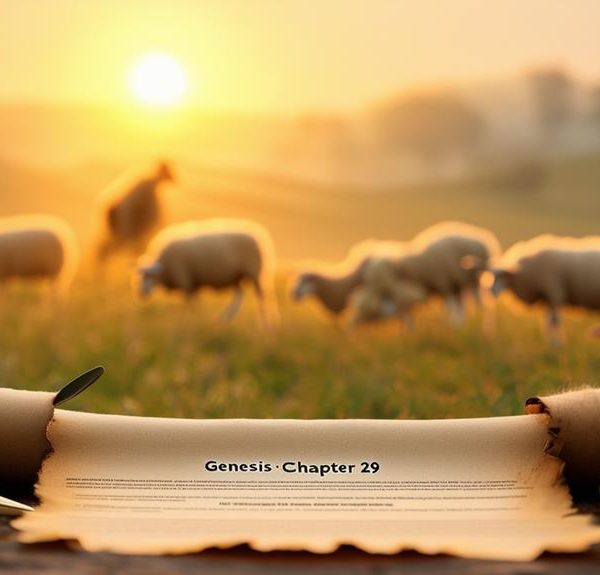

Sign up